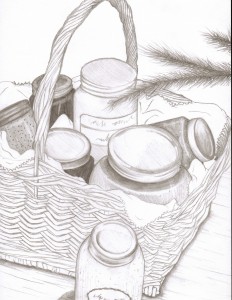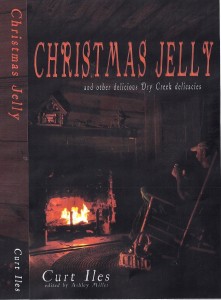
My short story collection, Christmas Jelly, was written in 32 chapters. This allows you (the reader) to
enjoy one chapter per day beginning December 1 and ending on January 1.
Here’s today’s serving of Christmas Jelly!
Enjoy!
The following fictional short story comes from a story told to me by the Miller and Lindsey families of
Dry Creek, Louisiana. Enjoy!
First Christmas in Dry Creek
J.J. Miller had set up camp where he had a good view of the surrounding area. There were no signs of any settlers in the last mile he’d come and had scouted down to the nearby creek and seen no recent signs of human habitation.
It was December 24, 1853 and he didn’t expect trouble on Christmas Eve, but a stranger in these woods couldn’t be too careful. He’d come down from South Carolina had experienced his share of difficulty along the way. He hoped his sojourn here in Louisiana would be easier.
At least the Deep South cold wasn’t unbearable. Back home on the East Coast, the weather could be brutal in early winter, but so far, it’d been fairly nice here.
A pot of coffee perked on the fire, as the twenty-five-year-old Miller, sat down beside a large beech with his loaded musket leaning against the tree.
His horse’s snorting was the first sign of approaching company. This alerted Miller, who laid his gun across his lap, partially covering it with an old blanket. He soon saw a man on a horse coming up out of the creek bottom. The easy manner the man sat on the horse didn’t seem like trouble, but Miller knew better than to relax.
He recalled stories he’d heard on the Natchez Trace about the area he now was in. It was called “The Outlaw Strip” and served as a haven for men wishing to live outside the law in nearby Texas or eastern Louisiana.
The approaching rider must have seen the rifle across Miller’s lap. He slowed his horse to a slow gait and raised his free hand in a friendly gesture. His other gloved hand was on the reins. Miller saw no visible weapon so he stood to his feet, holding his gun in the crook of his arm.
“Howdy, neighbor,” The rider said. Miller judged the older man to be about sixty. He also took note of the rider’s tone of voice. It had the same musical quality common among the Scot-Irish he’d left behind in the Carolinas.
After studying the older man further, Miller answered, “Evening, Sir. How are you?”
“I’m jes’ fine. You mind if I get off my horse for a visit?”
“Help yourself.” Miller did something he hadn’t planned to do—he leaned his gun against the tree and walked toward the dismounting rider.
The man walked up to Miller, taking off his right glove and extending his hand. “I’m Burkitt Lindsey.”
“My name’s John James Wilson Miller, lately of South Carolina.”
“Came a ways, didn’t you?”
“Sure did.” Miller noted the man’s strong grip as he asked, “What do you call this place here?”
“We call it Dry Creek.” The rider nodded behind him. “That creek is called Dry Creek.”
“Is it dry?”
“Never. I was told its Indian name was ‘Beautiful Creek’ and the English translation got buggered up.”
Miller laughed and so did the other man. “Now say your name again.”
“It’s Lindsey. Burkitt Lindsey. You by yourself?”
“I am. I’m looking for a place to settle where there’s plenty of room and a good creek to put in a water mill.”
“There’s plenty of space for sure around here.” Lindsey pointed toward the creek. “There’s several places down Dry Creek that might work well. Now what was your name again?”
“John James Wilson Miller,” the younger man answered, “but I go by ‘J.J.’ ”
“That’s a mighty long name for a fellow as young as you are.” The older man’s eyes twinkled as he said it.
Miller looked toward the creek bottom. “Is that where you live, Mr. Lindsey?”
“Me, my wife, and our kids live across the creek about a quarter.”
Miller noticed the visitor’s stare as he hesitated before asking, “Mr. Miller, do you know what tomorrow is?”
“I believe it’s Christmas Day.”
“You’re right. Do you have plans?”
Miller grinned toward his meager campsite. “Does it look like it?”
“Good. That means you’ll have Christmas dinner with us. No one should be alone on Christmas Day.”
The younger man hesitated, “I’m afraid I’d be a bother… and you’d need to ask your wife.”
“We’d be honored if you’d join us.”
“I’m not sure.”
“But I am. We’ll be looking forward to your visit.” As if the matter was settled, Lindsey walked to his horse. “When you get down to the creek tomorrow, just ford it and follow the trail up through the hardwoods, when you get back in the pines, you’ll be near our place.”
Clicking to his horse, he turned back toward the creek. “It was good meeting you, Mr. Miller.”
“You can call me J.J.”
“Good meeting you, J.J. Miller. We’ll see you for dinner tomorrow.”
“Thank you kindly, Mr. Lindsey.”
“It’s Burkitt.” The older man answered.
“Thank you, Burkitt… and Merry Christmas.”
“Merry Christmas to you, Son.”
Miller watched the man ride off into the gathering darkness before tossing another pine knot on the fire. It sizzled and sputtered as he said aloud, “I believe I might be able to like this place.”
The next day John James W. Miller crossed Dry Creek and joined the Burkitt Lindsey family for Christmas dinner. It began the friendship between these two homesteading families that now has stretched into its third century. He fell in love with, and later married, Burkitt Lindsey’s daughter Laura Francine.
Southwestern Louisiana is full of the descendants of these two pioneer families that still carry their good names in the piney woods.
The hospitality of the Lindsey family is indicative of what I love best about our area and its people. It’s shown in kindness to the stranger, a willingness to extend a hand of welcome to a newcomer. In the unforgettable days after Hurricane Katrina ravaged New Orleans as thousands of evacuees poured into our area, this same hospitality was extended to those strangers in need.
Three weeks later, when Hurricane Rita destroyed much of our area, these same qualities of aiding neighbors, self-reliance, and perseverance stood in good stead in Southwest Louisiana. The actions of people in our area didn’t make the national news but we didn’t expect to: Folks just did what Burkitt Lindsey did on that long ago Christmas: they “crossed the creek” and took care of their neighbors. No one waited on the government or some agency to come rescue them; they banded together, reached out, and helped each other out.
That attitude is really what Christmas is all about: Hospitality, service, and kindness as we celebrate the birth of the Savior Jesus who exemplifies everything about giving and sacrifice.
 Creekbank Stories Curt Iles, Storyteller
Creekbank Stories Curt Iles, Storyteller

